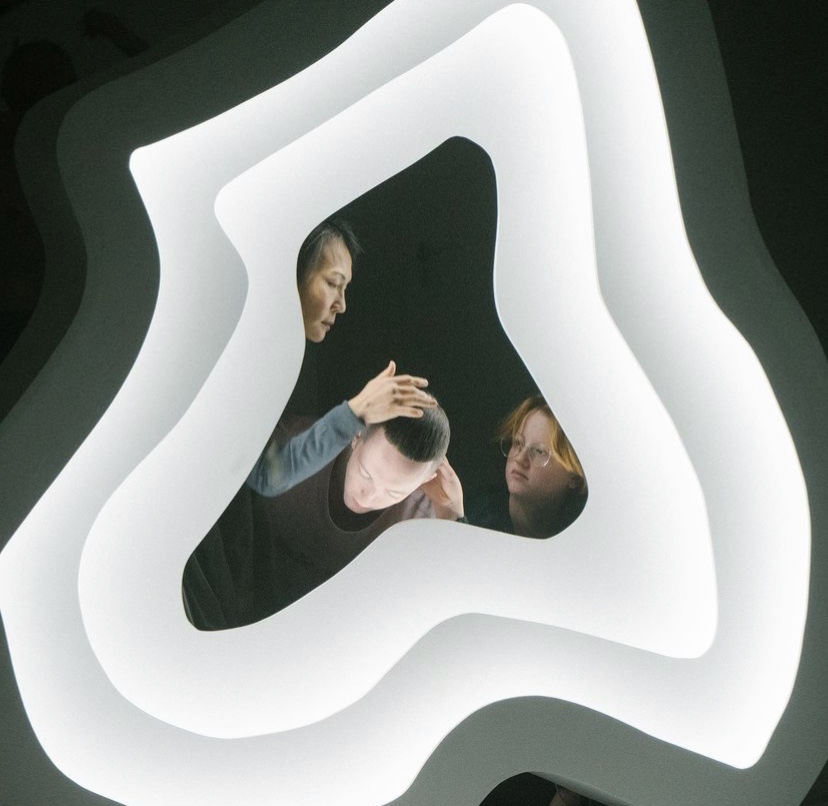Words by Hannah Draper. Performed at TRAMWAY on 24th February. Trigger warning – this article mentions rape.
Burning incense curls up from a metal bowl passed between the circle of whispering performers as I enter the space. The smell places me back into the Catholic Mass of my childhood. It is a sweet, woody, heady scent as mesmerising as the weighty swing of the shining silver incense burner which Jia-Yu Corti spirals through the space at the start of the performance. The hypnotic ritual-like tone of the piece puts me in a similar position to sitting in a church pew as a child – a feeling of openness but slight confusion and not knowing, attempting to de-code the images in front of me. Yet we are not in the Christian world but some futuristic landscape of the ancient-Greeks and the half-naked sacrificed body we are watching is not a man’s but a portrait of Daphne – the woman transformed into a tree to escape Apollo’s rape of her.
Oracle Leaves by Colette Sadler takes you down, not to the underworld, but perhaps to a limbo or dream-realm. The pace is slow and sporadic – time stretches and fast forwards through the changes from sculpture-esque to more random movement. The performers unnervingly bite their own limp hands, notes sung are stretched and warped, and Leah Marojevic’s body snaps and snarls around to buck an imagined horse into action in a feral, hungry and consuming solo as ‘Portrait of Daphne as Hunter’. Clothes are passed between performers – slickly changing and sharing their identities – culminating in ‘Portrait of Daphne as Garment’ in a billowing solo by Jia-Yu. While there are rarely, if ever, moments of unison, all the performers remain on stage the whole time supporting solo portraits while they stay in moments of tenderness and touch. Their constant presence a reminder of the myth of a singular, independent life or identity.
Coral, mushroomy sculptures are spread across stage. These rest on the performers’ bodies at one point – morphing them into a creaturely landscape, a forest or sea floor, a site of ruins. All the while, the performance is permeated by a swirling soundscape of growling, water, and dragging waves created by Cassandra Miller, Heiko Tubbesing and Samir Kennedy. A large burl-like light sculpture pulses and diffuses light – making the stage hospital-white-yellow, to soft red to bright blue. At one point, through the hole in the middle of this sculpture, the performers emerge to create painting-like images which create portraits that arise and dissolve as soon as they are made.
In the world we witness, multiple lives of one person co-exist and spill over across trees, mushrooms, fire, songs and bodies. Gender doesn’t exist here, nor does age or time. Sadler draws attention to the inaccuracy of a singular, static portrait and undermines the dominant representation of Daphne, in painting and sculpture, at her moment of transformation into a tree to escape rape. While there are undertones of violence and hunting in the piece, Sadler removes rape as the defining narrative of Daphne’s life – instead Daphne becomes an abundant and shifting entity representative of human interdependence on other life forms.
It is said that Daphne was transformed into a laurel tree, the leaves of which were burnt and put people into prophetic trances. At the end of the piece the incense is lit again, and we emerge from this world that we have been shown. Back to the world of humans and boundaries and borders with an already fading memory of a prophetic vision of interdependence and empathy, both futuristic and ancient, that perhaps we should dream of and try to hold close.
Oracles Leaves is fleshy, pulsating and patient. It presents life through states of transformation and beyond the human body. Watching the piece in my own present context, grief and death surround me, and others around me, at this point in time, so I am comforted by seeing Daphne exist beyond her human death.
Three nights after seeing the piece I dream about urgently searching for a bag of oracle leaves, which once found I hide protectively, close to my body.
